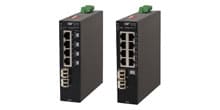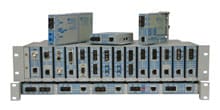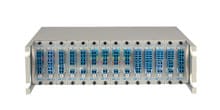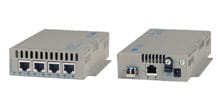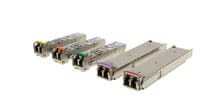What is Carrier Ethernet?
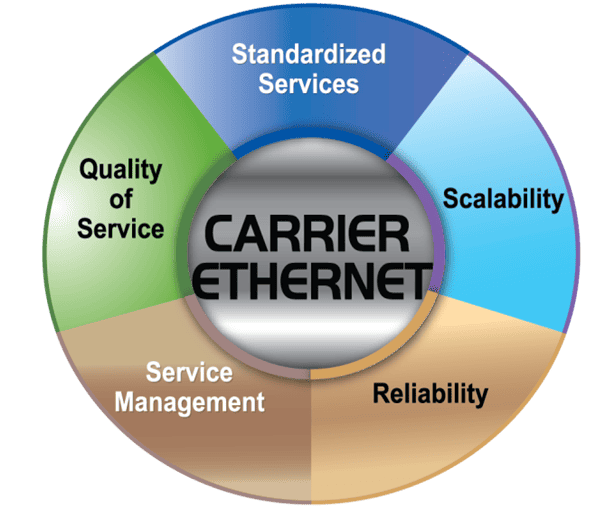 The Metro Ethernet Forum (MEF) is a standards body that defines services, develops standards and certification programs, and promotes the global adoption of Carrier Ethernet.
The Metro Ethernet Forum (MEF) is a standards body that defines services, develops standards and certification programs, and promotes the global adoption of Carrier Ethernet.
Carrier Ethernet is ubiquitous, standardized, carrier-class Ethernet Services and Networks characterized by five specific attributes. These 5 attributes distinguish Carrier Ethernet from familiar LAN based Ethernet:
1. Standardized Services
2. Reliability
3. Scalability
4. Service Management
5. Quality of Service
1. Standardized Services
Carrier Ethernet services are ubiquitous, standardized services delivered globally & locally. These standardized services include Ethernet Private Line (E-Line), Ethernet Private LAN (E-LAN services), Ethernet Virtual Private Line and Ethernet Virtual Private LAN services (several services multiplexed via one network interface). Carrier Ethernet services can be delivered to the customer without requiring the customer to change their network or LAN equipment.
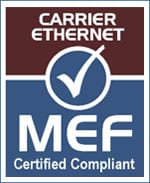 The MEF Certification Program for Carrier Ethernet ensures the delivery of Carrier Ethernet with the five attributes. The MEF certifies both a service provider’s ability to deliver Carrier Ethernet services as well as an equipment vendor’s ability to carry Carrier Ethernet services. The MEF certification ensures ubiquitous and globally consistent service delivery.
The MEF Certification Program for Carrier Ethernet ensures the delivery of Carrier Ethernet with the five attributes. The MEF certifies both a service provider’s ability to deliver Carrier Ethernet services as well as an equipment vendor’s ability to carry Carrier Ethernet services. The MEF certification ensures ubiquitous and globally consistent service delivery.
MEF 9
iConverter Network Interface Devices are MEF 9 certified compliant. MEF 9 includes the delivery of Ethernet Private Line, Ethernet Virtual Private Line, Ethernet Private LAN and Ethernet Virtual Private LAN services. Ethernet Line services provide point-to-point Ethernet connectivity. Ethernet LAN services are used to interconnect multiple sites.
MEF 14
iConverter NIDs are MEF 14 certified compliant. MEF 14 includes Service Performance and Bandwidth Profiles. Service Performance is quantified by three parameters: Frame Delay (FD), Frame Delay Variation (FDV) and Frame Loss Ratio. Bandwidth Profiles include the following parameters: Committed Information Rate (CIR), Committed Burst Size (CBS), Excess Information Rate (EIR), and Excess Burst Size (EBS). Bandwidth Profiles are delivered through traffic management policing and shaping functions.
2. Reliability
Carrier Ethernet services must meet the most demanding quality and availability requirements. Networks must detect and recover from incidents without impacting users. This reliability is achieved with Service OAM for rapid fault detection and management, and protection (redundancy) with geographical diversity and rapid recovery. iConverter NIDs enable reliable Ethernet services with end-to-end Service OAM and redundant link protection.
- IEEE 802.1ag Connectivity Fault Management
- ITU-T Y.1731 Performance Monitoring
- IEEE 802.3ah Link OAM
- Link Fail with 50ms Failover Protection Switching
- ITU-T G.8031 Ethernet Linear Protection
3. Scalability
Carrier Ethernet services must be scalable in bandwidth delivery. iConverter NIDs deliver scalable bandwidth from < 1 Mbps to 1 Gbps in granular increments. The network must also be scalable, delivering services to subscribers globally. iConverter NIDs are compact, cost effective and can be easily deployed everywhere with zero-touch provisioning and built-in RFC 2544 test-head.
4. Service Management
Service management includes software and network management systems used to provision, troubleshoot and maintain the network. Service Providers must have the ability to monitor, diagnose and centrally manage their network, using standards-based vendor independent implementations. iConverter NIDs support TELNET, SNMPv3 and Secure IP-Less management that can be integrated into telecom management and OSS systems. iConverter management controls remote provisioning, and Service OAM performance monitoring and fault notification.
5. Quality of Service
Carrier Ethernet services provide Quality of Service with a wide variety of tiered service options. Service Level Agreements (SLAs) guarantee end-to-end performance for subscriber applications such as voice, video and data. iConverter NIDs support Quality of Service prioritization and ITU-T Performance Monitoring that enables delivery of services with SLAs with end-to-end performance guarantees.


